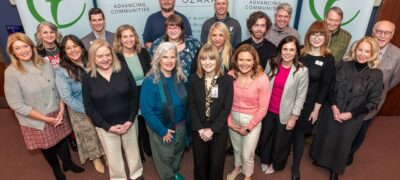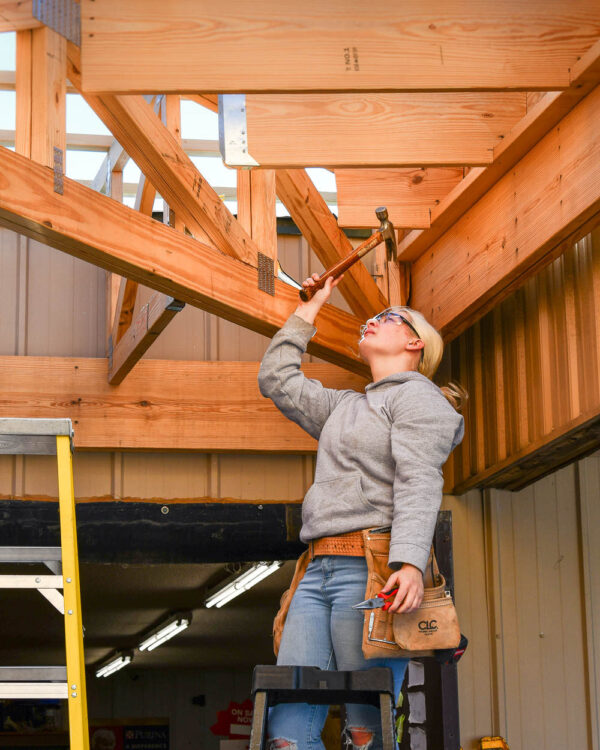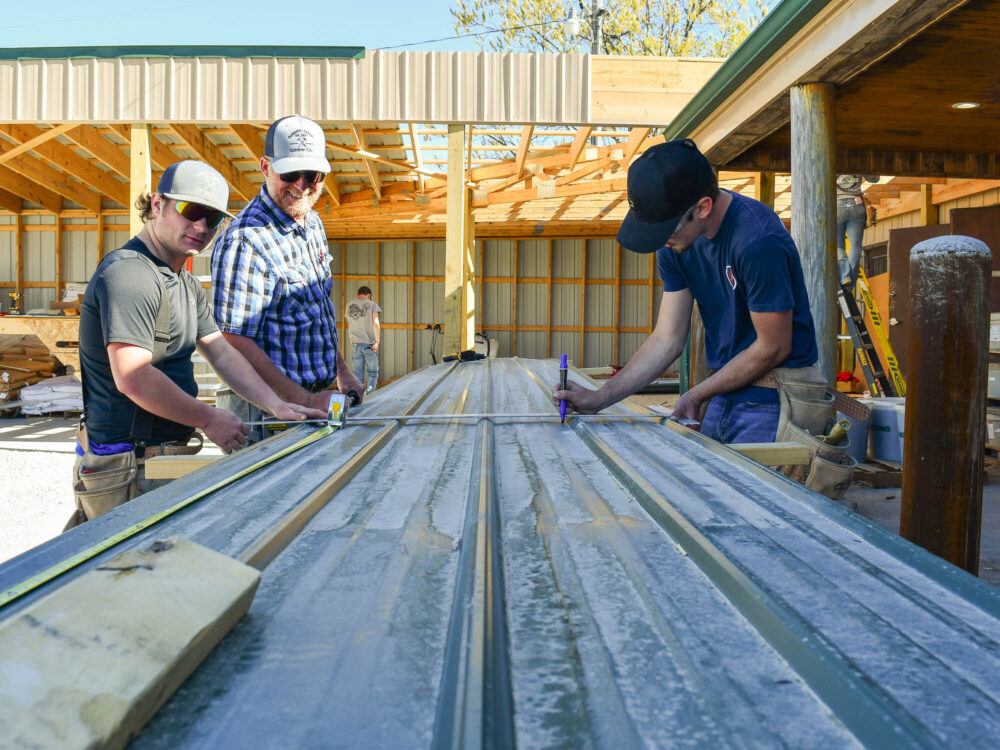CFO Stories
Building Salem’s Future through Students and Structures
Salem High School’s Construction Trades Program connects students with training — during the school day — that can translate into careers

Salem High School’s Construction Trades Program connects students with training — during the school day — that can translate into careers
The sounds of swinging hammers, buzzing saws and affirming words are proof that the Construction Trades Program at Salem High School is building structures and lives.
Through the program, students at Salem High School use time during the school day to learn many facets of the construction industry. It’s led by A.J. Tinker, who has a background in construction and teaching, and who was recruited to help develop the program six years ago.
“For me, what I see, is it helps these students get a very good work ethic,” says Tinker of an underlying benefit. “It’s something that they can always use — whether they stay in the trade or the field or not, it’s something they can utilize the rest of their life.”
The Dent County Community Foundation was part of getting the program started, a process that also involved the town of Salem’s participation in Growth in the Rural Ozarks. The initiative, founded in 2016 and initially supported by the Community Foundation of the Ozarks, offers training and economic-development coaching to towns in an effort to increase local prosperity.
“After many months of planning and meetings, a vision was cast for creating a program in the community where students could learn construction trades and technology skills locally,” says Mary Beth Cook, a DCCF board member who was part of the process. “Through the generous first gifts of Lisa and Wes Hester of $300,000 and a third anonymous donor of $50,000, the Salem R-80 Construction Trades & Technology Program was born.”
The students on the job on a sunny Wednesday are in one of three construction classes — the most advanced — that they can take at the high school. Their work is affected by the rate at which they learn and perfect techniques, but also other factors — like the weather.
“This is the first day in probably a week that we’ve not had real bad wind,” Tinker says of the roofing job they’re completing at Dent County Farm Supply. “These are so long pieces that we can’t really have much wind. We just have this area left right here for roof."

By the time they get to that job site, students are well-versed in basic construction methods. An intro class offers the basics, while the latter two options — two and three hours long each day, respectively — find them building larger projects or even commercial buildings, such as the addition at the local farm supply store.
“We do everything by hand. This is how they learn — hands on,” says Tinker.
It’s how he learned, too.
“My senior year, I had all of my credits taken care of, so my trades teacher put me to work,” Tinker says of his time in high school at nearby Steelville. After years in construction, he began to teach himself and sees from multiple perspectives the value of such a program: It’s good for the students, but also good for the community.
“It helps the public out,” Tinker says, who notes that sites pay a percentage of the materials’ cost. “It helps us out, it gives us projects, and it also generates enough money to buy new tools and take students on field trips.”
Examples of the latter might include jobs sites, or tech schools.
At times, the six-or-so students are working together — like when they all grab hold of the roofing material and take it to the roof — while other moments are spent on individual tasks like cutting more tin, nailing things down or measuring what needs to come next.
“To me, it honestly doesn’t matter what kind of trade it is — for them to be able to utilize any kind of a program trade, it’s a win-win for that student,” says Tinker.
That’s true for student Eva Heard, who stands on a ladder, hammer in hand, and says she initially got interested in the class because of her family.
“I was kind of already into construction because I would build deer stands with my dad,” she says, who notes she doesn’t plan to pursue construction after graduation. Her plan: fiber optics.

But while there might not be crossover with specific skills sets, the class has taught her “how to work with other people well,” she says. “I’m normally a very quiet person.”
On the flip side, fellow senior Chloe Calkins is convinced that construction is her future. It’s a realization that came because of the construction trades program.
“I got interested in woodworking and thought, ‘Oh, this is kind of cool,’” she says after taking the intro class. “I realized that construction was kind of the thing for me. I really appreciate what we’re building — I really like it.”
She plans to follow in Tinker’s footsteps to Rolla, where she’ll train in construction trades.
“This program really changed me,” she says.
Just as the program continues to literally build, its future building is figurative as well and has been built through phases.
The first was hiring Tinker and getting it up and running. The funding those donors provided through the DCCF, an affiliate of the CFO, went to fund Tinker’s salary and a truck and trailer. The arrangement was that over the course of three years, his salary would gradually be absorbed by the school district.
Next came construction of a building that will ultimately house the school’s construction trades and agriculture programs.
Back on the school campus, the exterior of that building is now complete. It rose in late 2023, when the community rallied to match a Community Development Block Grant for $500,000 made available through Missouri’s Department of Economic Development.
In less than a month, DCCF Board Member Cook says, community leaders raised more than $438,000 to lock in the initial state grant so the building project could continue.
“Creating a program that supports the much-needed and well-paying jobs of construction trades, including carpentry, electrical and plumbing, could not have come at a better time for our rural community,” Cook says. “This is an excellent example of public-private support for a program that will continue to have economic impact on our community for years to come.
“This project is a shining star for our community and demonstrates a great model for other rural community foundations to follow.”
The next effort: Securing more money — about $800,000 — to complete the building so it’s usable. At that time, Tinker also hopes the program can be expanded.
In the meantime, students continue working and learning. Another of those students is Tyler Rosemann, a senior who now plans to follow his family into the construction business.
“It kind of changed what I wanted to do,” he says, a decision that will make him the next in a several-generation line of carpenters. “Now I’m trying to go to the union for carpentry.”
By Kaitlyn McConnell, writer in residence at the Community Foundation of the Ozarks